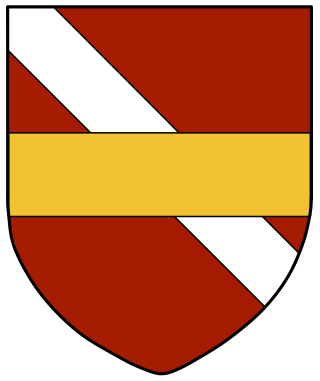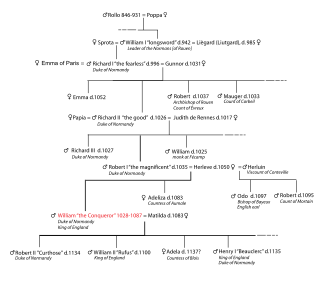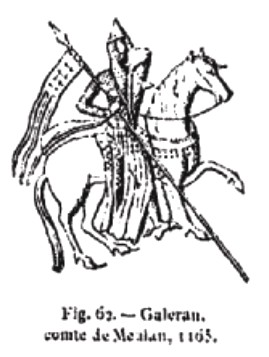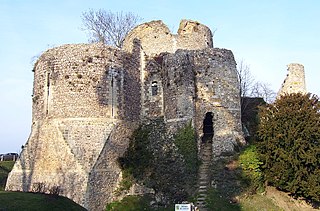Related Research Articles
William of Poitiers was a Norman priest who served as the chaplain of Duke William II of Normandy, for whom he chronicled the Norman conquest of England in his Gesta Willelmi ducis Normannorum et regis Anglorum. He had trained as a soldier before taking holy orders.

William FitzOsbern, 1st Earl of Hereford, Lord of Breteuil, was a relative and close counsellor of William the Conqueror and one of the great magnates of early Norman England. FitzOsbern was created Earl of Hereford in 1067, one of the first peerage titles in the English peerage. He is one of the very few proven companions of William the Conqueror known to have fought at the Battle of Hastings in 1066. His chief residence was Carisbrooke Castle on the Isle of Wight, one of many castles he built in England.

In the Middle Ages, the duke of Normandy was the ruler of the Duchy of Normandy in north-western France. The duchy arose out of a grant of land to the Viking leader Rollo by the French king Charles the Simple in 911. In 924 and again in 933, Normandy was expanded by royal grant. Rollo's male-line descendants continued to rule it until 1135, and cognatic descendants ruled it until 1204. In 1202 the French king Philip II declared Normandy a forfeited fief and by 1204 his army had conquered it. It remained a French royal province thereafter, still called the Duchy of Normandy, but only occasionally granted to a duke of the royal house as an appanage.

Pont-Audemer is a commune in the Eure department in the Normandy region in northern France. On 1 January 2018, the former commune of Saint-Germain-Village was merged into Pont-Audemer.

Waleran de Beaumont (1104–1166) was an Anglo-Norman nobleman. In his early adulthood, he was a member of the conspiracy of Amaury III of Montfort; later in his career, he participated in the Anarchy and the Second Crusade. During the reign of Henry II of England, Waleran's close ties to Louis VII of France caused him to fall out of grace.

Roger de Beaumont, feudal lord of Beaumont-le-Roger and of Pont-Audemer in Normandy, was a powerful Norman nobleman and close advisor to William the Conqueror.

The arrondissement of Bernay is an arrondissement of France in the Eure department in the Normandy region. It has 297 communes. Its population is 227,054 (2016), and its area is 3,226.7 km2 (1,245.8 sq mi).
Guy of Burgundy, also known as Guy of Brionne, was a member of the House of Ivrea with a claim to the Duchy of Normandy. He held extensive land from his cousin, Duke William the Bastard, but lost it following his unsuccessful rebellion in the late 1040s.

William the Conqueror had men of diverse standing and origins under his command at the Battle of Hastings in 1066. With these and other men he went on in the five succeeding years to conduct the Harrying of the North and complete the Norman conquest of England.
Raoul II de Tosny, lord of Conches-en-Ouche, was a Norman nobleman of the House of Tosny, son of Roger I of Tosny and older brother of Robert de Stafford / Tosny. He was active in Normandy, England and Wales.
Thorold is a city in Ontario, Canada.

Les Préaux is a commune in the Eure department and Normandy region of France.

The House of Harcourt is a Norman family, and named after its seigneurie of Harcourt in Normandy. Its mottos were "Gesta verbis praeveniant", "Gesta verbis praevenient", and "Le bon temps viendra ... de France".

The Beaumont family was one of the great Anglo-Norman baronial noble families, who became rooted in England after the Norman Conquest.
Humphrey de Vieilles was the first holder of the "grand honneur" of Beaumont-le-Roger, one of the most important groups of domains in eastern Normandy and the founder of the House of Beaumont. He was married to Albreda or Alberée de la Haye Auberie.

Roger I of Tosny or Roger of Hispania was a Norman nobleman of the House of Tosny who took part in the Reconquista of Iberia.
Giroie, Lord of Echauffour and Montreuil-l'Argillé, was a knight from Brittany who became a Norman nobleman and the progenitor of a large family in Normandy, England, and Apulia.
Torf, Seigneur de Torville, was a Norman baron. His parentage is unknown.
Préaux Abbey was a Benedictine monastery dedicated to Saint Peter at Les Préaux, in Normandy, France.
Turold may refer to:
References
- 1 2 3 4 Hagger 2017, p. 70.